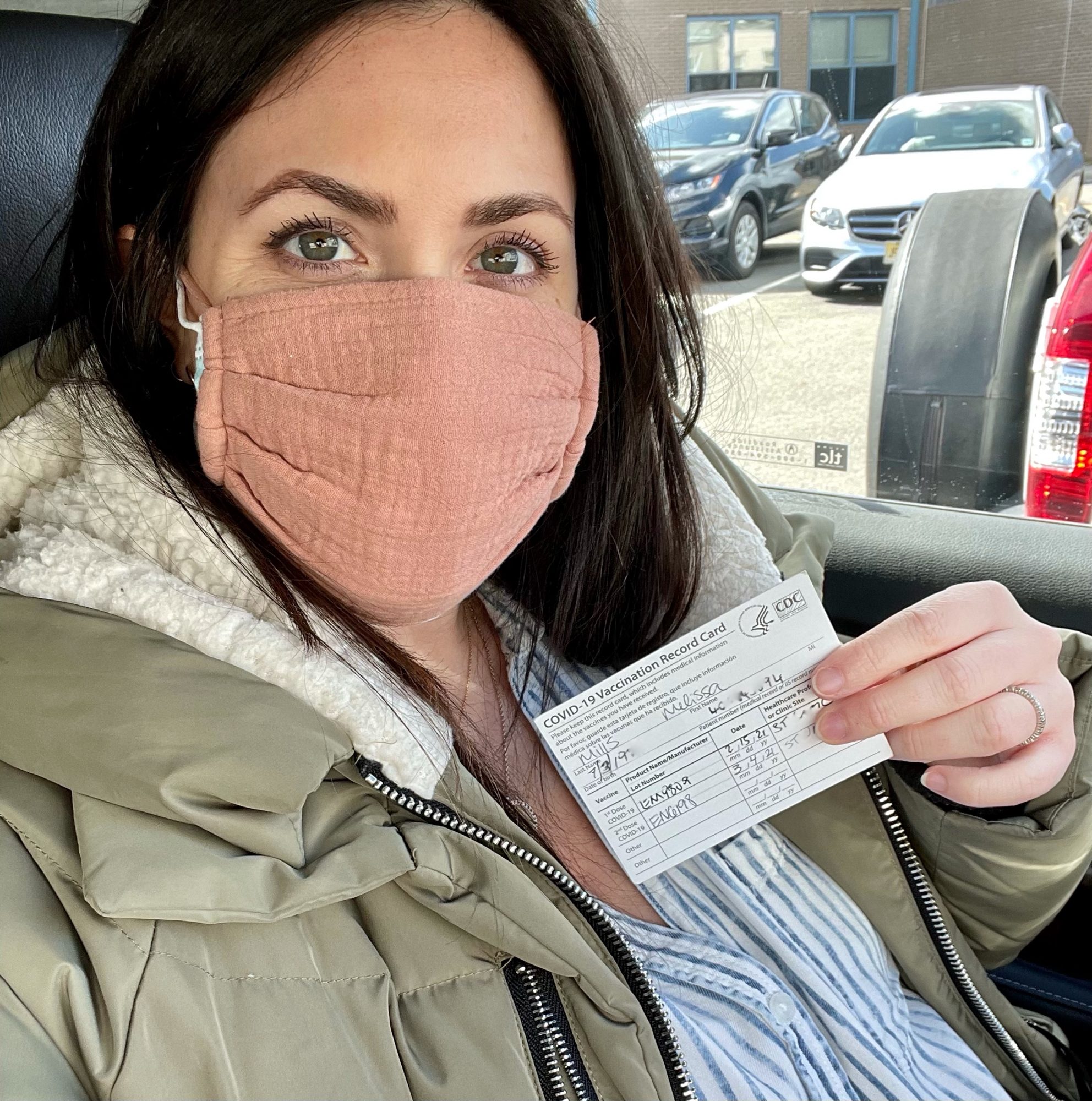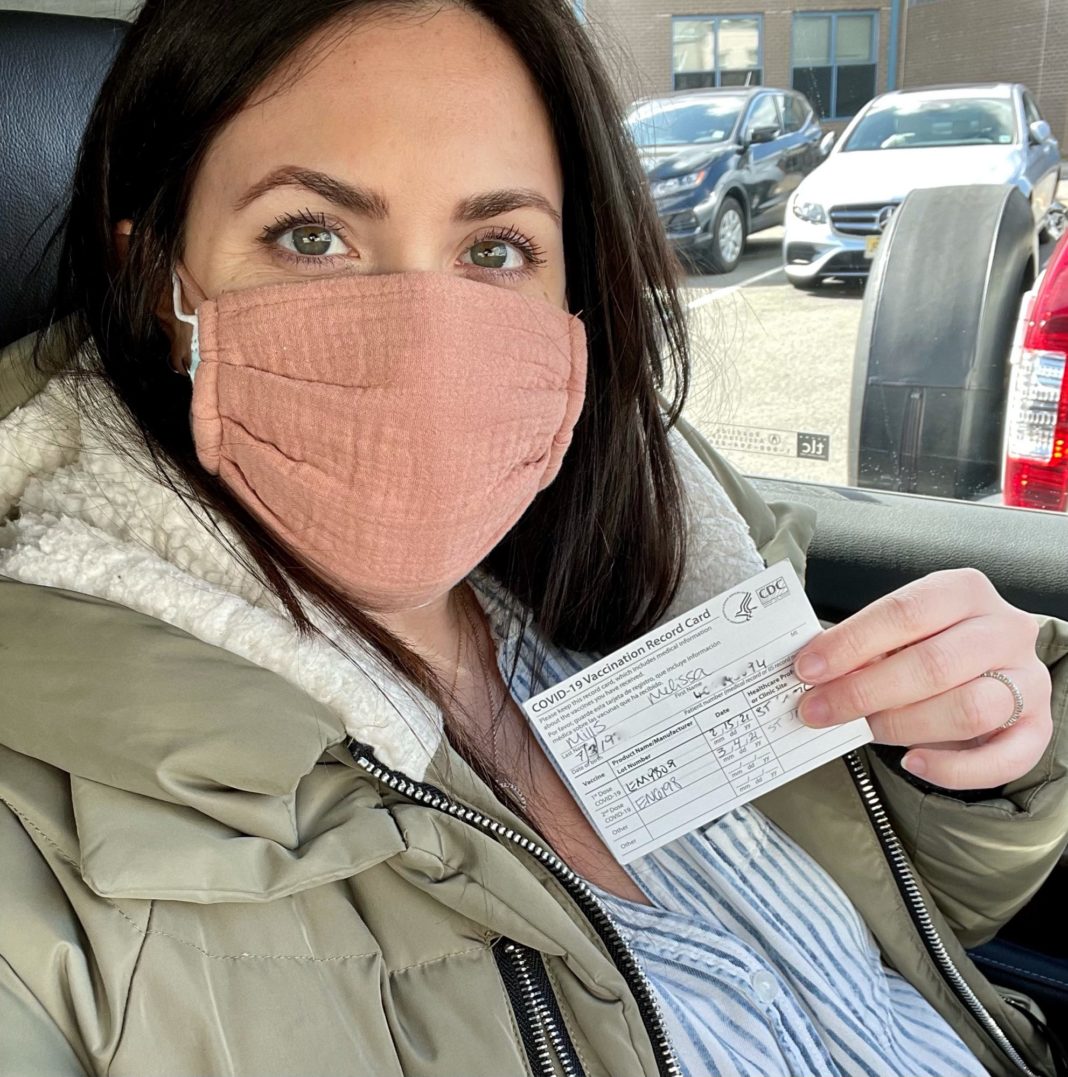
I did it. With my bump popping out in all its glory and two masks securely on my face, I got the COVID-19 vaccine in my third trimester. But the decision didn't come easy—even for me, someone who's written about the vaccines and has actually spoken to experts who recommend them for pregnant people.
I spent weeks trying to secure vaccination appointments for a few high-risk relatives. In New Jersey where I live, locking in an appointment felt like hitting the lottery. I joined multiple Facebook groups and turned on alerts to help get notified when sites would open up new spots, but I was having no luck. And then, one day, I got an email from the Department of Health notifying me that, since I was pregnant, I was now eligible to get the vaccine, too. I hit refresh on one of the sites I'd been trying and, just like that, finally got through. Quickly, I secured the appointments I needed—including one for myself. And then I froze.
Should I go through with it? After checking in with family, friends, and—of course—experts, plus doing my own research, I finally decided to roll up my sleeve and get vaccinated.
I'm so glad I did.
Here’s Why I Got the COVID-19 Vaccine While Pregnant
Understanding the importance of regular vaccinations for myself and my family, deciding to get the COVID-19 vaccine during my pregnancy still wasn't an easy decision. I had this new little human to think about and protect, after all. And since pregnant people weren't included in clinical trials, there simply isn't much data out there yet.
I wish it were more black and white, but even the Centers for Disease Control and Prevention (CDC) suggests pregnant people discuss getting the vaccine with their health care provider to make an informed decision, especially if they're at an increased risk of exposure.
All that said, here's what made me comfortable enough to go through with it—and why I'm so happy I did.
My OB-GYN gave me the green light
Above all else, getting the go-ahead from both of my doctors was crucial. They know my personal situation and the ins and outs of my pregnancy—and they recommended I get vaccinated.
I even spoke with two friends who are OB-GYNs who said they're telling their patients the same. Both stressed the fact that COVID-19 puts pregnant people at an increased risk of severe illness, intensive care unit (ICU) admission, mechanical ventilation, and death. One of the OB-GYNs—who received the vaccine herself while breastfeeding—even recounted the number of sick pregnant patients she's seen through the pandemic, including one who declined to get vaccinated, got COVID-19, and spent a week in the ICU.
Experts recommend it
The American College of Obstetricians and Gynecologists (ACOG), the Society for Maternal-Fetal Medicine (SMFM), and the American Society for Reproductive Medicine (ASRM) all recommend that pregnant and nursing people have access to the COVID-19 vaccine.
"While pregnancy puts women at higher risk of severe COVID-19, very little data are available to assess vaccine safety in pregnancy," said the World Health Organization in updated guidance. "Nevertheless, based on what we know about this kind of vaccine, we don't have any specific reason to believe there will be specific risks that would outweigh the benefits of vaccination for pregnant women."
Vaccine data is looking good
We're learning more as Americans are getting vaccinated across the country, but the information that's out there made me feel comfortable enough to keep my appointment. These are the two big ones that reassured me:
Pfizer-BioNTech, the drugmaker whose vaccine was first approved for rollout in the U.S., is also starting clinical trials on pregnant people, so we should know even more in the coming months.
What I Learned Along the Way
The vaccination process is actually super easy
For me, the process of fighting for an appointment and the anxiety leading up to getting the vaccine was far worse than the experience of actually getting either dose of the Pfizer-BioNTech vaccine.
While some people can expect side effects like muscle pain, fever, or chills, I only experienced soreness at the injection site after receiving my first shot and a sore arm, headache, and some fatigue—nothing some Tylenol couldn't help with—the day after my second.
Honestly, I found being pregnant more uncomfortable than anything I felt after vaccination.
Fully vaccinated people can start getting back to “normal” again
New guidance from the CDC suggests that people who have been fully vaccinated (that is, two weeks after the final dose) can start to safely enjoy some of the pre-pandemic things they've been missing.
With a newborn on the way and a toddler at home, the thought of starting to congregate with loved ones and show off our new bundle of joy leaves me feeling hopeful for the coming months.
Peace of mind is a powerful thing
Ultimately, every pregnant person will have to consult with their own doctor, weigh the risks, and make the personal decision for themselves.
With just about one more month to go until my second son is born, I really feel at peace with my decision to get vaccinated knowing how much went into it. Plus, knowing there's a chance I could potentially pass on antibodies and protect my son from COVID-19 is enough for me to justify why I feel like I made the right choice for my family.
I'm a vaccinated, soon-to-be mom of two, and I couldn't be happier—or more swollen or uncomfortable or tired from peeing all night. But, hey, I can't blame everything on the coronavirus.
































